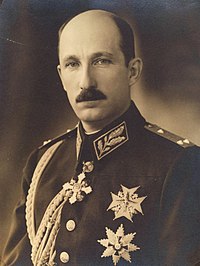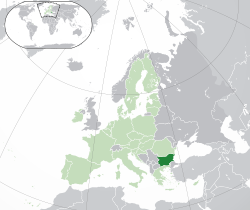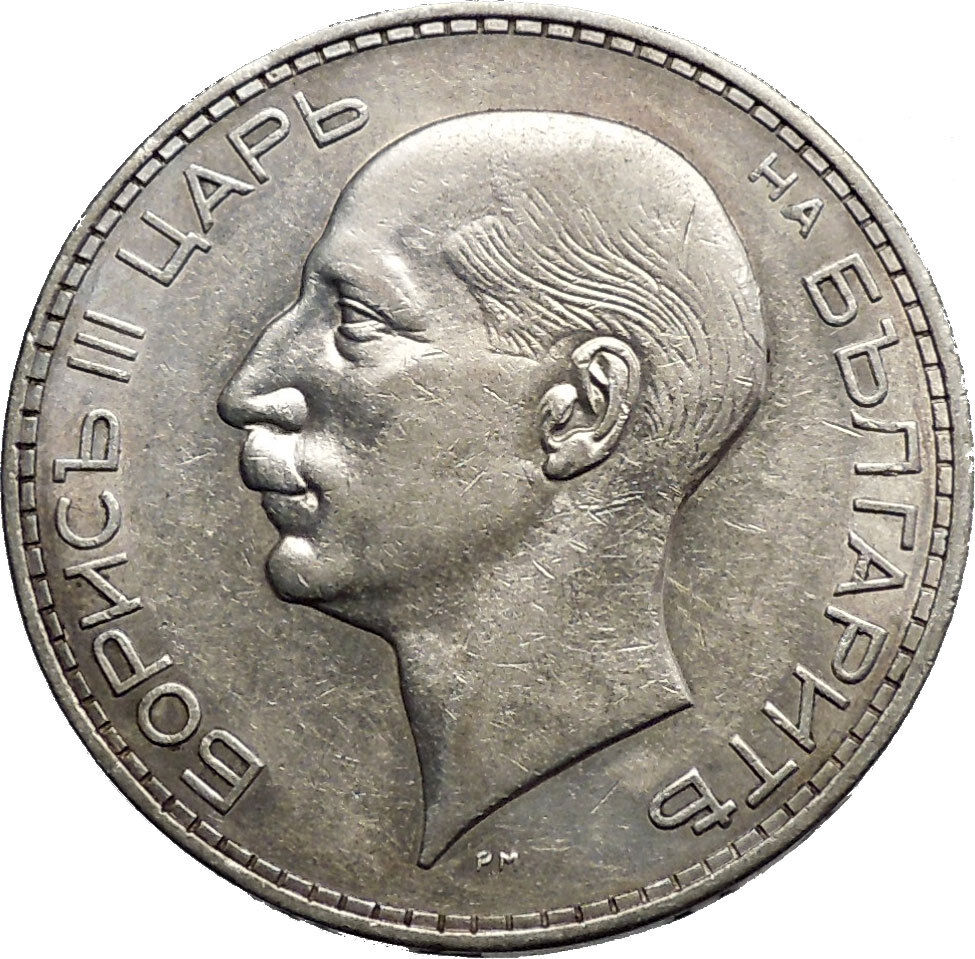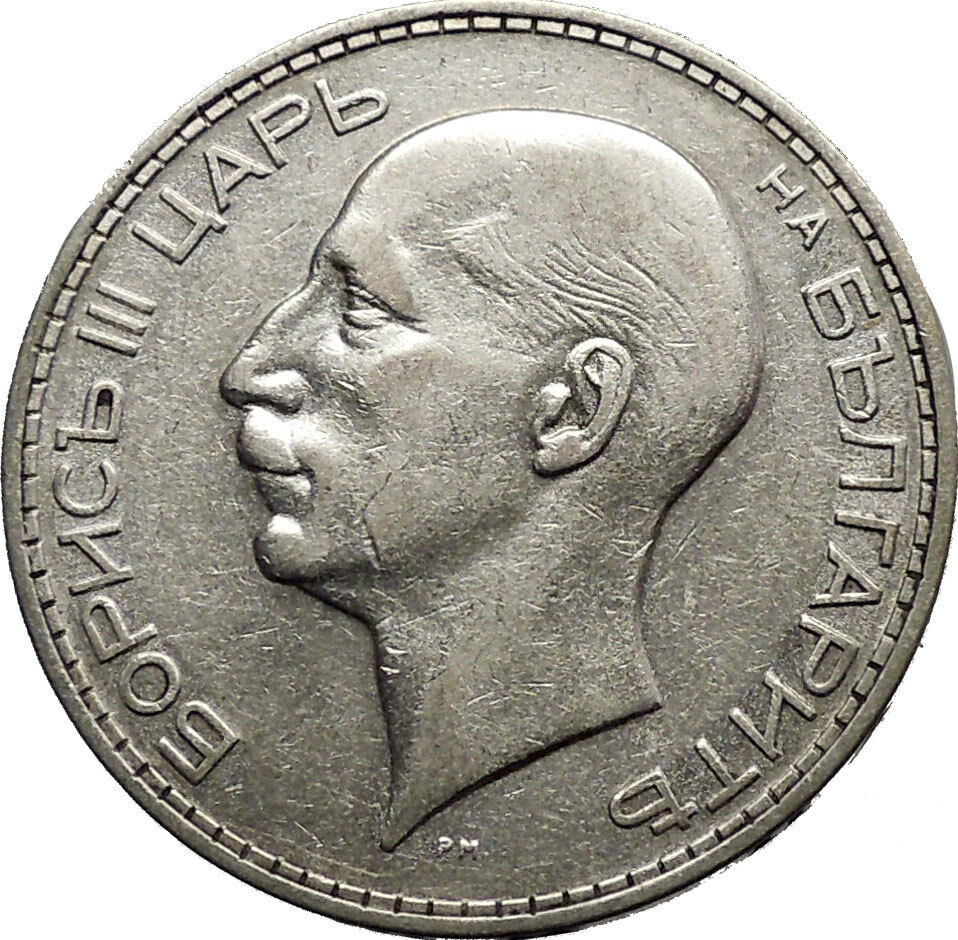|
Bulgaria
Boris III – Tsar of Bulgaria: 3 October 1918 – 28 August 1943
1934 Silver 100 Leva 34mm (19.90 grams) 0.500 Silver (0.3194 oz. ASW)
Reference: KM# 45 | Designer: Percy Metcalfe
БOPИCЪ III ЦАРЬ НА БЪЛГАИТѢ, Boris facing left.
100 ЛEBA 1934, Two stalks of wheat and flower and bottom.
You are bidding on the exact item pictured, provided with a Certificate of Authenticity and Lifetime Guarantee of Authenticity.
 Boris III, Tsar of Bulgaria (30 January [O.S. 18 January] 1894 – 28 August 1943), originally Boris Klemens Robert Maria Pius Ludwig Stanislaus Xaver (Boris Clement Robert Mary Pius Louis Stanislaus Xavier), son of Ferdinand I , came to the throne in 1918 upon the abdication of his father, following the defeat of the Kingdom of Bulgaria during World War I. This was the country’s second major defeat in only five years, after the disastrous Second Balkan War (1913). Under the Treaty of Neuilly , Bulgaria was forced to cede new territories and pay crippling reparations to its neighbours, thereby threatening political and economic stability. Two political forces, the Agrarian Union and the Communist Party, were calling for the overthrowing of the monarchy and the change of the government. It was in these circumstances that Boris succeeded to the throne. He distinguished himself during the Second World War by opposing attempts by Adolf Hitler to deport the Jewish population of his country. Boris III, Tsar of Bulgaria (30 January [O.S. 18 January] 1894 – 28 August 1943), originally Boris Klemens Robert Maria Pius Ludwig Stanislaus Xaver (Boris Clement Robert Mary Pius Louis Stanislaus Xavier), son of Ferdinand I , came to the throne in 1918 upon the abdication of his father, following the defeat of the Kingdom of Bulgaria during World War I. This was the country’s second major defeat in only five years, after the disastrous Second Balkan War (1913). Under the Treaty of Neuilly , Bulgaria was forced to cede new territories and pay crippling reparations to its neighbours, thereby threatening political and economic stability. Two political forces, the Agrarian Union and the Communist Party, were calling for the overthrowing of the monarchy and the change of the government. It was in these circumstances that Boris succeeded to the throne. He distinguished himself during the Second World War by opposing attempts by Adolf Hitler to deport the Jewish population of his country.
Boris was born on 30 January 1894 in Sofia . He was the first son of Prince Ferdinand of Bulgaria and his wife Princess Marie Louise .
In February 1896 his father paved the way for the reconciliation of Bulgaria and Russia with the conversion of the infant Prince Boris from Roman Catholicism to Eastern Orthodox Christianity , a move that earned Ferdinand the frustration of his wife, the animosity of his Catholic Austrian relatives (particularly that of his uncle, Franz Joseph I of Austria ) and excommunication from the Catholic Church. In order to remedy this difficult situation Ferdinand christened all his remaining children as Catholics. Nicholas II of Russia stood as godfather to Boris and met the young boy during Ferdinand’s official visit to Saint Petersburg in July 1898.
He received his initial education in the so-called Palace Secondary School which Ferdinand created in 1908 solely for his sons. Later, Boris graduated from the Military School in Sofia , then took part in the Balkan Wars . During the First World War he served as liaison officer of the General Staff of the Bulgarian Army on the Macedonian front . In 1916 he was promoted to colonel and attached again as liaison officer to Army Group Mackensen and the Bulgarian Third Army for the operations against Romania . Boris worked hard to smooth the sometimes difficult relations between Field Marshal Mackensen and the commander of the 3rd army Lieutenant General Stefan Toshev . Through his courage and personal example he earned the respect of the troops and the senior Bulgarian and German commanders, even that of the Generalquartiermeister of the German Army Erich Ludendorff , who preferred dealing personally with Boris and described him as excellently trained, a thoroughly soldierly person and mature beyond his years. In 1918 Boris was made a major general and with the abdication of his father acceded to the throne as Tsar Boris III on 3 October 1918.
One year after Boris’s accession, Aleksandar Stamboliyski (or Stambolijski) of the Bulgarian People’s Agrarian Union was elected prime minister. Though popular with the large peasant class, Stambolijski earned the animosity of the middle class and military, which led to his toppling in a military coup on 9 June 1923, and his subsequent assassination. On 14 April 1925 an anarchist group attacked Boris’s cavalcade as it passed through the Arabakonak Pass. Two days later a bomb killed 150 members of the Bulgarian political and military elite in Sofia as they attended the funeral of a murdered general (see St Nedelya Church assault ). Following a further attempt on Boris’s life the same year military reprisals killed several thousand communists and agrarians, including representatives of the intelligentsia. Finally, in October 1925, there was a short border war with Greece, known as the Incident at Petrich , which was resolved with the help of the League of Nations .
In the coup on 19 May 1934 , the Zveno military organisation established a dictatorship and abolished the political parties in Bulgaria. King Boris was reduced to the status of a puppet king as a result of the coup. The following year, he staged a counter-coup and assumed control of the country by establishing a regime loyal to him. The political process was controlled by the Tsar, but a form of parliamentary rule was re-introduced, without the restoration of the political parties. With the rise of the “King’s government” in 1935, Bulgaria entered an era of prosperity and astounding growth, which deservedly qualify it as the Golden Age of the Third Bulgarian Kingdom. It lasted nearly five years.
Boris married Giovanna of Italy , daughter of Victor Emmanuel III of Italy , first in a Catholic ceremony in Assisi , Italy in October 1930 (attended by Benito Mussolini ), and then at an Orthodox ceremony in Sofia. The marriage produced a daughter, Maria Louisa , in January 1933, and a son and heir to the throne, Simeon , in 1937.

Bulgaria (Bulgarian: България, tr. Bǎlgariya), officially the Republic of Bulgaria (Bulgarian: Република България, tr. Republika Bǎlgariya, IPA: [rɛˈpublikɐ bɐɫˈɡarijɐ]), is a country in southeastern Europe. It is bordered by Romania to the north, Serbia and Macedonia to the west, Greece and Turkey to the south, and the Black Sea to the east. With a territory of 110,994 square kilometres (42,855 sq mi), Bulgaria is Europe’s 16th-largest country.
 Organised prehistoric cultures began developing on current Bulgarian lands during the Neolithic period. Its ancient history saw the presence of the Thracians, Ancient Greeks, Persians, Celts, Romans, Goths, Alans and Huns. The emergence of a unified Bulgarian state dates back to the establishment of the First Bulgarian Empire in 681 AD, which dominated most of the Balkans and functioned as a cultural hub for Slavs during the Middle Ages. With the downfall of the Second Bulgarian Empire in 1396, its territories came under Ottoman rule for nearly five centuries. The Russo-Turkish War of 1877-78 led to the formation of the Third Bulgarian State. The following years saw several conflicts with its neighbours, which prompted Bulgaria to align with Germany in both world wars. In 1946 it became a one-party socialist state as part of the Soviet-led Eastern Bloc. In December 1989 the ruling Communist Party allowed multi-party elections, which subsequently led to Bulgaria’s transition into a democracy and a market-based economy. Organised prehistoric cultures began developing on current Bulgarian lands during the Neolithic period. Its ancient history saw the presence of the Thracians, Ancient Greeks, Persians, Celts, Romans, Goths, Alans and Huns. The emergence of a unified Bulgarian state dates back to the establishment of the First Bulgarian Empire in 681 AD, which dominated most of the Balkans and functioned as a cultural hub for Slavs during the Middle Ages. With the downfall of the Second Bulgarian Empire in 1396, its territories came under Ottoman rule for nearly five centuries. The Russo-Turkish War of 1877-78 led to the formation of the Third Bulgarian State. The following years saw several conflicts with its neighbours, which prompted Bulgaria to align with Germany in both world wars. In 1946 it became a one-party socialist state as part of the Soviet-led Eastern Bloc. In December 1989 the ruling Communist Party allowed multi-party elections, which subsequently led to Bulgaria’s transition into a democracy and a market-based economy.

Bulgaria’s population of 7.2 million people is predominantly urbanised and mainly concentrated in the administrative centres of its 28 provinces. Most commercial and cultural activities are centred on the capital and largest city, Sofia. The strongest sectors of the economy are heavy industry, power engineering, and agriculture, all of which rely on local natural resources.
The country’s current political structure dates to the adoption of a democratic constitution in 1991. Bulgaria is a unitary parliamentary republic with a high degree of political, administrative, and economic centralisation. It is a member of the European Union, NATO, and the Council of Europe; a founding state of the Organization for Security and Co-operation in Europe (OSCE); and has taken a seat at the UN Security Council three times.
|





 Boris III, Tsar of Bulgaria (30 January [O.S. 18 January] 1894 – 28 August 1943), originally Boris Klemens Robert Maria Pius Ludwig Stanislaus Xaver (Boris Clement Robert Mary Pius Louis Stanislaus Xavier), son of Ferdinand I , came to the throne in 1918 upon the abdication of his father, following the defeat of the Kingdom of Bulgaria during World War I. This was the country’s second major defeat in only five years, after the disastrous Second Balkan War (1913). Under the Treaty of Neuilly , Bulgaria was forced to cede new territories and pay crippling reparations to its neighbours, thereby threatening political and economic stability. Two political forces, the Agrarian Union and the Communist Party, were calling for the overthrowing of the monarchy and the change of the government. It was in these circumstances that Boris succeeded to the throne. He distinguished himself during the Second World War by opposing attempts by Adolf Hitler to deport the Jewish population of his country.
Boris III, Tsar of Bulgaria (30 January [O.S. 18 January] 1894 – 28 August 1943), originally Boris Klemens Robert Maria Pius Ludwig Stanislaus Xaver (Boris Clement Robert Mary Pius Louis Stanislaus Xavier), son of Ferdinand I , came to the throne in 1918 upon the abdication of his father, following the defeat of the Kingdom of Bulgaria during World War I. This was the country’s second major defeat in only five years, after the disastrous Second Balkan War (1913). Under the Treaty of Neuilly , Bulgaria was forced to cede new territories and pay crippling reparations to its neighbours, thereby threatening political and economic stability. Two political forces, the Agrarian Union and the Communist Party, were calling for the overthrowing of the monarchy and the change of the government. It was in these circumstances that Boris succeeded to the throne. He distinguished himself during the Second World War by opposing attempts by Adolf Hitler to deport the Jewish population of his country.
 Organised prehistoric cultures began developing on current Bulgarian lands during the Neolithic period. Its ancient history saw the presence of the Thracians, Ancient Greeks, Persians, Celts, Romans, Goths, Alans and Huns. The emergence of a unified Bulgarian state dates back to the establishment of the First Bulgarian Empire in 681 AD, which dominated most of the Balkans and functioned as a cultural hub for Slavs during the Middle Ages. With the downfall of the Second Bulgarian Empire in 1396, its territories came under Ottoman rule for nearly five centuries. The Russo-Turkish War of 1877-78 led to the formation of the Third Bulgarian State. The following years saw several conflicts with its neighbours, which prompted Bulgaria to align with Germany in both world wars. In 1946 it became a one-party socialist state as part of the Soviet-led Eastern Bloc. In December 1989 the ruling Communist Party allowed multi-party elections, which subsequently led to Bulgaria’s transition into a democracy and a market-based economy.
Organised prehistoric cultures began developing on current Bulgarian lands during the Neolithic period. Its ancient history saw the presence of the Thracians, Ancient Greeks, Persians, Celts, Romans, Goths, Alans and Huns. The emergence of a unified Bulgarian state dates back to the establishment of the First Bulgarian Empire in 681 AD, which dominated most of the Balkans and functioned as a cultural hub for Slavs during the Middle Ages. With the downfall of the Second Bulgarian Empire in 1396, its territories came under Ottoman rule for nearly five centuries. The Russo-Turkish War of 1877-78 led to the formation of the Third Bulgarian State. The following years saw several conflicts with its neighbours, which prompted Bulgaria to align with Germany in both world wars. In 1946 it became a one-party socialist state as part of the Soviet-led Eastern Bloc. In December 1989 the ruling Communist Party allowed multi-party elections, which subsequently led to Bulgaria’s transition into a democracy and a market-based economy.





